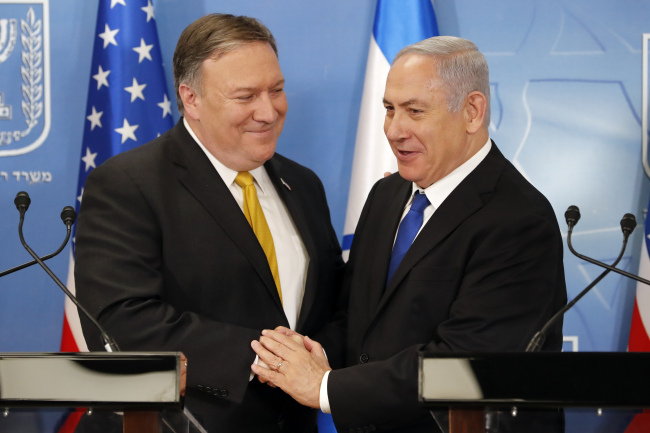WASHINGTON/SEOUL -- The United States has an obligation to engage in diplomacy with North Korea to find a peaceful solution to its nuclear weapons issue, the top US diplomat has said.
US Secretary of State Mike Pompeo made the remark in an interview broadcast Sunday ahead of a planned meeting between US President Donald Trump and North Korean leader Kim Jong-un.
"We have an obligation to engage in diplomatic discourse to try and find a peaceful solution so that Americans aren't held at risk by Kim Jong-un and his nuclear arsenal," Pompeo told ABC.
 |
(Yonhap) |
He also said there is a "real opportunity" for progress.
Trump is expected to meet with Kim in May or early June to talk about the denuclearization of the regime. South Korean President Moon Jae-in and Kim also met on Friday and committed to "complete denuclearization" of the Korean Peninsula while agreeing to work towards a peace treaty to formally end the 1950-53 Korean War.
Pompeo met with Kim on his secret visit to Pyongyang over Easter weekend.
He said they had a "good conversation" on the "hardest issues that face our two countries."
The North Korean leader is "prepared" to "lay out a map that would help us achieve that objective," he said, referring to complete, verifiable and irreversible denuclearization.
Calling Kim "very well prepared," he added, "I hope I matched that."
"We talked about serious matters ... I had a clear mission statement from President Trump. When I left there, Kim Jong-un understood the mission exactly as I've described it today," Pompeo said, adding, "Only time will tell if we can get that done."
On what can be expected from the first Trump-Kim meeting, the secretary of state said he hopes to see "a number of things" achieved.
"I talked about getting the release of the American detainees, and then we talked a great deal about what it might look like, what this complete, verifiable, irreversible mechanism might look like," he said of his talks with Kim. "And so when the two leaders -- the only people who can make those decisions -- will be in a room together, they can set the course; they can chart the outcome; they can then direct the teams to go deliver that outcome."
Pompeo acknowledged that there is skepticism about negotiating with North Korea because past agreements to freeze the nuclear program in exchange for aid ultimately collapsed.
"My goal was to try and identify if there was a real opportunity there. I believe there is," he said. "Who knows how the ultimate discussions will go. There is a lot of work left to do, but I'm very hopeful that the conditions that have been set by President Trump give us this chance."
The Trump administration "has its eyes wide open" going into the negotiations and will demand "actions and deeds" that demonstrate the regime's intent to denuclearize, he said. Until then, the sanctions on Pyongyang will remain in place.
Asked if there will be any easing of sanctions before total denuclearization, Pompeo dodged a direct answer.
"We'll see how the negotiations proceed, but we're going to do it in a fundamentally different way than the previous efforts to persuade the North Koreans to get rid of their nuclear weapons program," he said.
On whether military action is a realistic option to remove the nuclear program, Pompeo said only that Trump has been very clear that the US is "not going to allow Kim Jong-un to continue to threaten America."
"We're not going to let him develop a program such that Americans are held at risk," he said.
Pompeo expressed hope North Koreans will also be able to live in better conditions once the nuclear issue is resolved.
"I believe that one of the reasons that Kim Jong-un is engaged in this conversation is that the pressure campaign that has been applied by President Trump and, indeed, by the world has put them in an even more tenuous, more difficult position," he said. "And so I am optimistic. We will work hard to see if we can't find a solution so that the North Korean people can, in fact, live a better life."(Yonhap)






![[Herald Interview] 'Trump will use tariffs as first line of defense for American manufacturing'](http://res.heraldm.com/phpwas/restmb_idxmake.php?idx=644&simg=/content/image/2024/11/26/20241126050017_0.jpg)
![[Exclusive] Hyundai Mobis eyes closer ties with BYD](http://res.heraldm.com/phpwas/restmb_idxmake.php?idx=644&simg=/content/image/2024/11/25/20241125050044_0.jpg)
